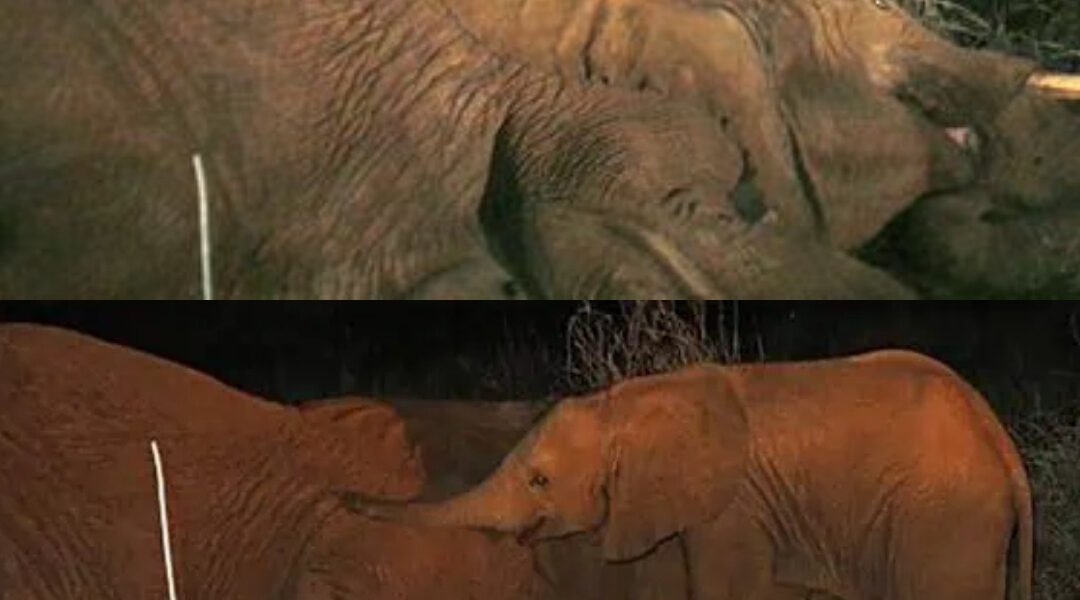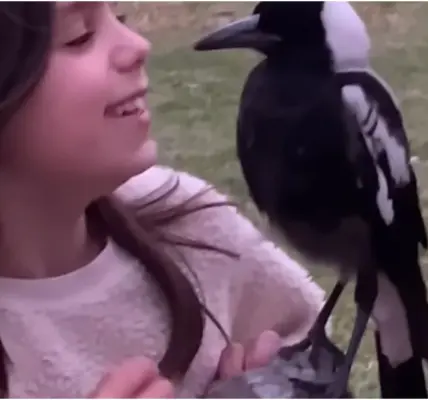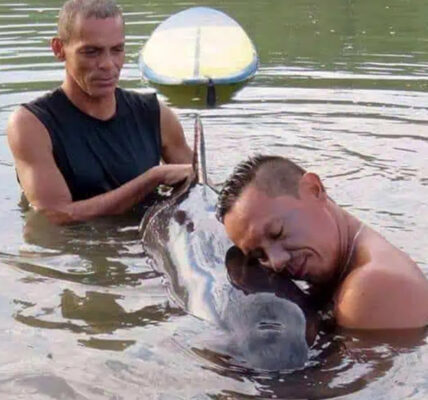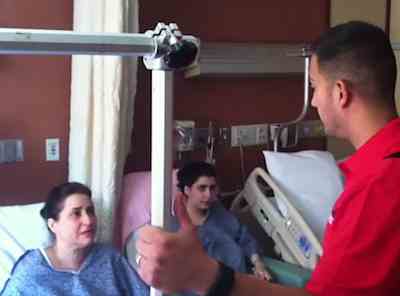In the quiet stillness of the African night, where the wind moves softly through the grass and stars stretch endlessly across the sky, a small figure stood unmoving beside a far larger one.

A five-month-old elephant calf pressed his forehead against the still, cold body of his mother.
He didn’t understand death.
He only understood love.
And he was not ready to let go.
For hours, the calf refused to leave her side. When hyenas cried in the distance, he did not run. When the temperature dropped sharply after sunset, he stayed pressed against her, trying to wake her with tiny nudges of his trunk. His soft, trembling rumbles echoed into the darkness — a grief too young to be understood, but deep enough to break the hearts of all who witnessed it.
This is the story of Sokotei, the baby elephant who said goodbye with more devotion than many adults ever learn.
A Mother Lost, A Calf Left Behind
The mother elephant had fallen victim to a severe infection — one that spread too quickly, stealing her strength and leaving her too weak to continue. By the time rangers found her, she was gone.
Her little calf stood there, shaking with fear and cold, but unwilling to move. To him, she was safety. She was comfort. She was the world.
In the wild, losing a mother is one of the greatest dangers a young elephant can face. Without her, a calf cannot defend itself, cannot keep warm, cannot navigate, and cannot survive long on its own. Predators watch for moments like this. Nights grow colder. Hunger grows stronger.

But that night, despite everything, the calf refused to abandon her.
He waited.
He watched.
He stayed.
The Team That Would Not Give Up
As soon as word reached wildlife experts, a rescue mission began. A team of rangers, veterinarians, and elephant protectors traveled through the dark and rain, determined to save the grieving calf before predators or exposure could reach him.
When they arrived, the scene was almost too heartbreaking to bear.
The small bull stood stubbornly over his mother’s body, ears low, trunk wrapped across her like a child clinging to a blanket. Every time the team approached, he let out soft, shattered cries — calls meant for a mother who would never answer.
The rescuers understood immediately: this was not just a rescue.
This was a broken heart they needed to save.

Throughout the night, they tried to coax him away, but he kept returning to her — pressing his head against her belly, as if begging her to breathe again.
So the team did the only thing they could:
They stayed with him.
Patient. Silent. Gentle.
They waited for morning.
The Rescue at Dawn
At first light, when the calf was finally too exhausted to resist, veterinarians moved in with care that was almost maternal. A tranquilizer was administered — just enough to calm him, not enough to harm him. Slowly, his tiny legs gave out, and he lay down beside the only family he had ever known.
The team wrapped him in blankets and prepared him for transport.
And as they carried him away, his trunk reached out one last time toward the mother he was leaving behind.
From the airstrip, the calf was flown north — away from danger, away from loneliness, toward a new beginning he could not yet understand.
His new home would be the David Sheldrick Wildlife Trust Elephant Orphanage — a sanctuary for elephants whose stories begin in heartbreak but do not end there.

A New Name, A New Life
At the orphanage, keepers named him Sokotei.
He arrived weak, thirsty, and emotionally shattered. He cried for his mother. He searched for her. He paced restlessly, unsure of where he was or why she was not beside him.
But something beautiful happened.
One by one, other orphaned elephants approached him — gently touching him with their trunks, rumbling softly in welcome. Elephants who had once lost their own mothers seemed to sense exactly what he needed.
Warmth.
Reassurance.
Belonging.

Soon, Sokotei was drinking milk from giant bottles, splashing in water, following his keepers, and slowly — very slowly — letting himself trust again.
The keepers loved him like family. They slept near him, fed him, comforted him during nightmares, and stayed with him around the clock.
Because a baby elephant does not only need milk.
He needs love.
The Road to Reintegration
As Sokotei grew stronger, he began learning the skills he would someday need to return to the wild: how to forage, how to communicate, how to form bonds with other elephants, how to read the language of the savanna.
When he becomes big enough — around three years old — Sokotei will be moved to a reintegration center in Tsavo National Park. There, he will learn what his mother didn’t have time to teach him: how to become a full-grown bull elephant who can walk his own path.
Reintegration can take years. Some orphans stay until they are ten, even twelve, before choosing a wild herd to join. Some return to visit their human keepers long after they’ve returned to freedom.
But every one of them carries the same story:
Broken once.
Loved back to life.
Released when ready.

A Story That Speaks for Thousands
Sokotei’s rescue is not unique — and that is why it matters.
Every year, elephants are lost to disease, drought, poaching, or human conflict. Every year, calves are left behind. And every year, teams like those at the David Sheldrick Wildlife Trust risk everything to save them.
Nearly 50 elephants were rescued last year alone.
Each of them carries a story like Sokotei’s — a story that begins with loss, but ends with hope.

The Little Elephant Who Loved Too Deeply
Sokotei’s vigil beside his mother is more than a moment captured in photographs.
It is a testament to the emotional depth elephants possess — grief, loyalty, love, and heartbreak as real as any human’s.
It is a reminder of what we stand to lose if the world does not protect these gentle giants.
And it is proof that even in the wild, in places filled with danger and uncertainty, love still stands its ground — even if it comes in the shape of a tiny trunk pressed against a mother’s silent heart.
Sokotei survived because humans refused to turn away.
May his story inspire more of us to do the same.




